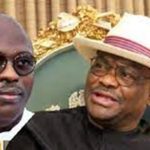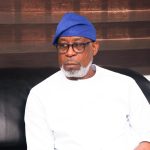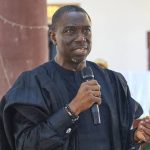Leo Stan Ekeh: Why he deserves the National Productivity Award
RAY UMUKORO

On Thursday, November 28, President Muhammadu Buhari conferred the prestigious National Productivity Order of Merit (NPOM) award on Leo Stan Ekeh, Oba Otudeko, Aliko Dangote, Tony Elumelu and others. No fewer than 25 individuals and seven corporates were honoured with the productivity award. It was a list that advertised the very best of Nigeria’s entrepreneurial prowess, industry and hard work. The award ceremony was the highpoint of the 18th National Productivity Day (NPD), organised by the National Productivity Centre.
The NPOM, administered by the Federal Government through the Ministry of Labour and Employment has over the years remained the rites of compensation for Nigerians who distinguished themselves in their field of endeavour. This year’s edition has persons in the academia, media, entrepreneurship, etcetera as recipients. And truly, no one can fault the choices. The NPOM is not an all-comers club like the Nigerian National Honours list which is often populated by politicians and their contractor cronies. NPOM rewards merit, productivity, resourcefulness, inventiveness and creativity.
Take, for instance, the case of Aliko Dangote who got a special award. Dangote’s story is a gripping narrative of how a yesterday’s apprentice merchant has worked his way to the top as an entrepreneur. He is reputed as the world’s richest black man; the richest man in Africa and the largest single private sector employer on the continent. He grew his business from merchandising to manufacturing; from importing and selling sugar and cement to manufacturing both for both domestic consumption and export. He has over time added pastries, flour and other households into his vastly expanding business empire. His appetite for success and wealth-creation has driven him to delve into oil and gas in a manner that will stretch your imagination.
He is a true Nigerian legend who epitomized humility, simplicity and a rare audacity to break new grounds. Dangote has become synonymous with success. Everything he touches turns to gold. All of this he achieved in a country where you are your own water works and electricity company. Dangote has brought Nigeria honour and for such, we should celebrate him.
On the NPOM award list is a scion of the South East, famed for their legendary spirit of merchandise and raw entrepreneurial bravura. His name: Leo Stan Ekeh. He rallied from a small office which also served as his home to create a conglomerate in Information Communications Technology (ICT). Today, his ceaseless exertions have brought global attention to Nigeria. He is a serial digital entrepreneur who has defied all known odds. Founder of Zinox Technologies, the first Nigerian Original Equipment Manufacturer (OEM) to produce globally certified computer systems; pioneer of e-commerce in Nigeria through the short-lived Buyright Africa, the precursor to all e-commerce houses in Nigeria.
His e-commerce seed did not die after all. His son, Prince Nnamdi Ekeh, the young Founder of Yudala has under the guidance and fiscal comfort of his father acquired Konga, currently ranked the fastest growing e-commerce company in Africa. Leo Stan’s appetite for success is boundless. He dares where others deter. He takes his chances. He spots opportunities and he’s not afraid to take the plunge. And truly, he has taken chances in a brave new world, the world of information communication technology.
His is an amazing story of how a young Nigerian university graduate after his pursuit of knowledge in India and the United Kingdom returned to the country to chart an entirely new course. He pioneered a new world of digital economy at a time the country was deeply mired in analogue culture both in the workplace and in schools. The Nigerian media industry, from advertising to newspaper, owes him a debt of gratitude for changing their operational processes and methodologies from mundane, medieval analogue to the robust and elegant digital platform.
With a militant spirit and unflinching missionary zeal, Ekeh took on the challenge of computerising the nation. And he has made a success of this through the Computerise Nigeria Initiative and other similar landmark ICT-driven projects that have impacted on young Nigerians from students to young graduates turning otherwise rusty and crusted rookies into geeky nerds. Appointed a Microsoft Ambassador, a global recognition for his unrelenting commitment to widen and deepen Nigeria’s digital economy, Ekeh has nonetheless refused to walk in the shadow of any foreign conglomerate. He pioneered indigenous assembly of globally-certified computer range, from personal computer to tablets; among other start-ups.
Within a space of over 30 years, Ekeh has transformed a start-up which sprouted from a make-shift apartment that also doubled as his home into a digital conglomerate with incursion into oil and gas services, entertainment and property. Task Systems, Technology Distribution, Konga (Africa’s foremost truly composite e-commerce outpost combining offline-online mix in service delivery), TD Mobile, TDLife to name a few complete the ensemble of businesses in his thriving conglomerate.
Ekeh’s enlistment into the hall of fame of NPOM, considered by some commentators as belated, speaks eloquently to his prime position in the nation’s ICT ecosystem. His patriotic fervour to expose young Nigerians to digital literacy is peerless.
The list of 2019 NPOM awardees also featured entrepreneurs like John Momoh, a mediapreneur who conceptualized and birthed Channels TV from his home in Dolphin Estate, Lagos. Today, Channels TV is a broadcast media empire. Tony Elumelu and Oba Otudeko need no introduction, neither do we need further extrapolation on their entrepreneurial adroitness.
One thing common to these men is that they are all Nigerians who grew their businesses in Nigeria, a nation reputed for its poor ease-of-doing business index. They grew their business empires in an environment with very poor infrastructure including one of the deadliest and most dangerous road networks in human history, poor electricity supply and volatile socio-economic indicators. They thrived in a system with high interest rate; where banks do not finance ideas and where loans, any amount, are difficult to source.
Most of all, they succeeded in a country where the governments, at any level, have a demonstrable aversion for home-made goods and services and would rather import the product or outsource the same service an indigenous firm could easily provide to a foreign company. Nigeria has a rich history of capital flight yet these entrepreneurs have been able to chisel their way to the very cusp of profitability.
In some other climes, banks finance ideas that are yet to become reality (you can even obtain loan to go to school and the system will help you to pay back when you begin to work after graduation). In other climes, entrepreneurs do not worry about poor roads; power supply is guaranteed and expertise is available. Not so here. Every enterprise provides its own water supply, electricity, builds its own roads and is hamstrung by issues of multiple taxation, inconsistent government policies which cripple forecast and planning among other strangulating factors. Yet, these outliers among a plethora of other entrepreneurs rode these storms to transform start-ups to multinationals. They are our own versions of the Asia Chaebol (family-run businesses) in the mould of Korea’s LG Group owned by Koo and Huh families; the Samsung Group owned by the Lee family, among others.
These entrepreneurs present us with a banner of hope in an oasis of despair. Imagine what the Nigerian narrative would have become if they started and failed. And they have justifiable reasons to fail: the inclement business environment. But despite these thorns on their path, they braved their way, creating wealth, adding value to the national economy and answering the question: Why should Nigeria celebrate?
Indeed Nigeria should celebrate her icons of productivity. It should celebrate the likes of Leo Stan Ekeh, Mike Adenuga, Aliko Dangote, Tony Elumelu, Oba Otudeko et al. These men have against odds overcome the failure stereotype often associated with the black man. They have provided answer to the question: can good leadership and healthy corporate governance happen in Nigeria?
It is often said that the reward for hard work is more work. President Buhari, represented on the occasion, by Secretary to the Government of the Federation, Boss Mustapha, urged all awardees to double their efforts to support the nation, adding that “to whom much is given, much is expected.”
Ekeh is not new to garlands. He had previously been decorated with the national honour of Officer of the Order of the Federal Republic (OFR) and was at a time named ‘Icon of Hope’ by President Olusegun Obasanjo whose government patronized indigenous technologies as a matter of national policy.
The man from Ubomiri community on the outskirts of Owerri, Imo State, has not only created wealth at home through year-on-year productivity, he has rallied to global reckoning in the ICT ecosystem. He sure deserves his diadem; a toast to and emblem of his unrelenting productivity and contribution to national development.
- Umukoro, ICT analyst, writes from Lagos








